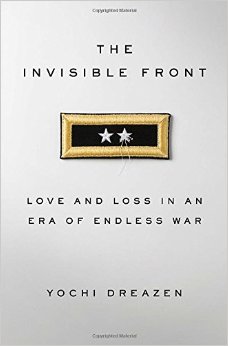 The Invisible Front: Love and Loss in an Era of Endless War by Yochi Dreazen, Crown Publishers, 2014.
The Invisible Front: Love and Loss in an Era of Endless War by Yochi Dreazen, Crown Publishers, 2014.
If you’re a fan of early 20th-Century fiction (or if you’ve taken college-level literature classes), you probably recognized the title of this post as being the first line of Ford Maddox Ford’s novel The Good Soldier. This book is indeed beyond sad: the story of a military family, the father a two-star general, who lose two sons: one to suicide and one to battle. It caught my eye on the new books shelf at the library, and I checked it out thinking that I probably wouldn’t read much of it since it would be unbearable. What pulled me along was the quality of the writing: Dreazen is a well-respected military journalist, and he tells this story without any attempt to wring tears from his readers, which he doesn’t have to do anyway. The story speaks for itself. He is able to bring many voices into his narrative; people were astonishingly open with him.
I do wonder how he can possibly know some things: how can he say, “Jeff Graham yawned and tried to rub the sleep from his eyes” on the morning of the day he died? Did a fellow soldier see him do this and report this small action later?
Two ideas struck me the most as I read. One is the absolute senselessness of the Iraq War, but I won’t spend any time on that one as there’s no point. The other is a bit more dicey. I know that whenever someone commits suicide that grief over the death itself is compounded by feelings of blame: Why didn’t we see how depressed our loved one was? Why didn’t we intervene? In this case, as in so many, the suicide’s slide to death was fueled at least partly by drugs and alcohol. And here’s where I find this whole story to be so unbelievable, and so telling, and so . . . scarey. Kevin, the younger son who hangs himself at age 21, has been drinking heavily for years. Here’s a typical passage, describing Kevin at age 17. “Melanie” is his 15-year-old sister.
The other thing that helped Kevin get over his innate shyness was alcohol. He had a fake Ohio driver’s license, which meant that he would always be the one charged with buying booze for house parties or night-time barbeques on the beach. He would bring wine coolers and light beer for Melanie and her friends and Jack Daniel’s for himself close friends. Carol and Mark [the parents] wouldn’t realize until much later that their son was using alcohol to mask the depression that was casting an increasingly large shadow over his life” (68).
To which I say, “Huh?” I just don’t get it. How could you not know that your two teenagers are out drinking? (Actually, the older brother Jeff who died in Iraq was a hearty partier also, but by this time he was off at college.) Wouldn’t you at least smell the alcohol on their breath the next morning? Wouldn’t they display their hangovers in some way? (And, on a much less important topic, who’s doing the cooking for these “night-time barbeques”? And who’s paying for all this? It’s just mind-boggling.) Kevin’s father was a decorated Army officer; his mother was known for keeping close tabs on her oldest son when she worked as a substitute teacher at his high school: “Mrs. Graham would have found out immediately if he was misbehaving, and she would have just killed him for it,” says one of Jeff’s friends. So neither one of them was naive or permissive. I guess the lesson here is that, if someone is determined to hide something, it’s usually possible to do it. If the wife is always the last to know about her husband’s infidelity, then I guess the parents are always the last to know about their children’s misdeeds and problems. And then they look back, and grieve, and agonize when the consequences are tragic. If this book wakes up even one complacent parent, I’m sure the Grahams would say that the hours of painful interviews they had to give to the author were worth it. Don’t take it for granted that everything is fine! Maybe it’s not.